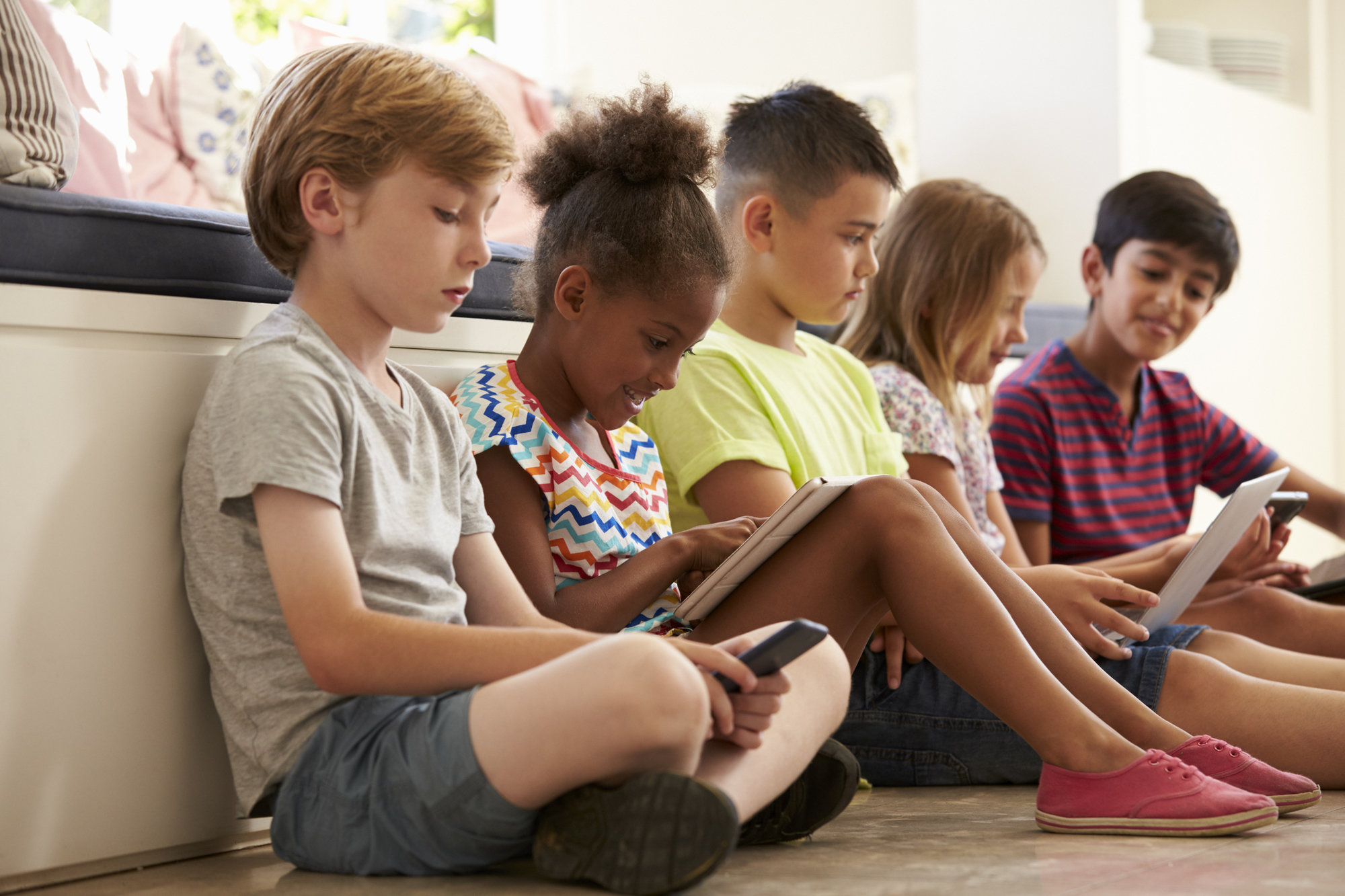There are undeniable pros to giving your kids their own smartphones — like being able to reach your child any time, or research virtually any homework subject without going to the library (and, let’s be honest, apps that entertain cranky toddlers in the car are pretty great, too). But one of the biggest looming concerns in the back of every parent’s mind is how an overabundance of screen time is negatively impacting kids’ social skills. According to one survey, 75 percent of kids 12 and older own cell phones, and they report using text messages more than any other type of interaction, including face-to-face.
Embedded content: https://media.giphy.com/media/TFMoOxjnAAMbm/giphy.gif
“Instead of learning the essential communication skills of talking to someone face-to-face and looking them in the eye, kids are accustomed to just looking at a screen and texting someone,” Sarah Graham, a tech expert and writer for the Digital Addicts blog, tells CafeMom. “This could affect them later in life when needing to communicate for a job or interview.”
As psychologist and author Jean M. Twenge wrote in the Atlantic, kids these days are less likely to socialize, date, or even hold a part-time job. A survey of 5,000 teens showed twelfth graders in 2015 were going out with their friends less often than eighth graders did in 2009. Even scarier, some researchers are linking the surge in smartphone use with a dramatic rise in teen depression and suicide rates.
More from CafeMom: 9 Hidden Dangers of Letting Your Kids Use Technology
As a mother of three, I’ve definitely given this issue some thought. I’ll admit that at times, it seems my 16-year-old daughter and my 12-year-old son are surgically attached to their iPhones; even my 3-year-old knows his way around a touch screen a little too well. And while all three of them seem fairly well-adjusted and sociable (if I do say so myself), occasionally, something about their behavior will give me pause.
For example, I recently had a talk with my daughter about our shared distaste for having actual phone conversations.
“Ugh, why can’t people just text?!” she lamented after having to speak to a human being for several minutes.
“I know!” I agreed, before stopping to think about what kind of anti-social example I was setting. “It’s the worst.”
Of course I recognize that having an aversion to real conversation isn’t the healthiest attitude for my daughter — or for me — to have. And there’s no question that being able to text or email instead of talk has definitely made this aversion somewhat socially acceptable, or at least easier to indulge. But can I blame technology for these tendencies? Both my daughter and I are somewhat introverted by nature. But I know I’m capable of in-person interactions. Can the same be said for our kids, who don’t remember a time before text bubbles?
Someecards
Part of the attraction to virtual communication is the sense of safety, according to Tim Lynch, PhD, a psychologist who’s studied how computer interaction affects personality.
“People have a preference for texting or tweeting rather than actually talking because there is a perceived anonymity to that form of communication,” Dr. Lynch tells CafeMom.
“People feel safer so they express things in texts that they would never actually say to another person’s face. That’s why there is cyberbullying, cybershaming and why some teens feel it’s okay to ask some celeb they have never met for a prom date rather than ask the teen next door. The same sense of entitlement and anonymity that fosters road rage is what is present here. There is also the flip side in that people have been found to be more open and honest to a computer than to another person.”
More from CafeMom: Gorgeous Photo Seris Captures the Wonders of a Tech-Free Childhood
At least that’s something of a silver lining, I guess? Still, shouldn’t the goal be learning how to communicate honestly and openly face-to-face? Raising introverts is one thing; raising kids who are better at using emojis than real facial expressions is another thing entirely. So far, when it comes to reading offline social cues, my kids seem to be doing fine. They haven’t morphed into droids just yet. The long-term view presented by scientists and researchers, though, is hard to ignore.
Embedded content: https://media.giphy.com/media/1IDqrFySO6y1a/giphy.gif
“From my earliest research up to now, I have found that interacting with intelligent machines like smartphones does socialize people into behavior that mimics the machine,” says Dr. Lynch. “In other words, the way we communicate by smartphone, texting, and email carries over to face-to-face interaction styles. People are more direct, less amenable to small talk, more abrupt, expect answers right away, are less patient, converse in shorter sentences.”
As with most things, kids are more impressionable and susceptible to technology’s influence than adults. The good news, however, is that the potential damage done by our kids’ constant access to technology is relatively easy to reverse. A 2014 study out of UCLA found that kids who were kept away from their screens for just five days (at an outdoor education camp) became notably better at reading the emotions of real, live human beings based on their facial expressions. Only five days!
So no matter how tech-addicted our kids might be, it appears all hope is not lost. It’s never too late to encourage our kids to get out there and make connections IRL. Naturally, this means we also have to do the same. But I won’t lie — I’ll probably always like texting better than talking on the phone.



title: “The 1 Big Reason Kids Social Skills Are Regressing” ShowToc: true date: “2024-10-08” author: “Alan Wilson”
There are undeniable pros to giving your kids their own smartphones — like being able to reach your child any time, or research virtually any homework subject without going to the library (and, let’s be honest, apps that entertain cranky toddlers in the car are pretty great, too). But one of the biggest looming concerns in the back of every parent’s mind is how an overabundance of screen time is negatively impacting kids’ social skills. According to one survey, 75 percent of kids 12 and older own cell phones, and they report using text messages more than any other type of interaction, including face-to-face.
Embedded content: https://media.giphy.com/media/TFMoOxjnAAMbm/giphy.gif
“Instead of learning the essential communication skills of talking to someone face-to-face and looking them in the eye, kids are accustomed to just looking at a screen and texting someone,” Sarah Graham, a tech expert and writer for the Digital Addicts blog, tells CafeMom. “This could affect them later in life when needing to communicate for a job or interview.”
As psychologist and author Jean M. Twenge wrote in the Atlantic, kids these days are less likely to socialize, date, or even hold a part-time job. A survey of 5,000 teens showed twelfth graders in 2015 were going out with their friends less often than eighth graders did in 2009. Even scarier, some researchers are linking the surge in smartphone use with a dramatic rise in teen depression and suicide rates.
More from CafeMom: 9 Hidden Dangers of Letting Your Kids Use Technology
As a mother of three, I’ve definitely given this issue some thought. I’ll admit that at times, it seems my 16-year-old daughter and my 12-year-old son are surgically attached to their iPhones; even my 3-year-old knows his way around a touch screen a little too well. And while all three of them seem fairly well-adjusted and sociable (if I do say so myself), occasionally, something about their behavior will give me pause.
For example, I recently had a talk with my daughter about our shared distaste for having actual phone conversations.
“Ugh, why can’t people just text?!” she lamented after having to speak to a human being for several minutes.
“I know!” I agreed, before stopping to think about what kind of anti-social example I was setting. “It’s the worst.”
Of course I recognize that having an aversion to real conversation isn’t the healthiest attitude for my daughter — or for me — to have. And there’s no question that being able to text or email instead of talk has definitely made this aversion somewhat socially acceptable, or at least easier to indulge. But can I blame technology for these tendencies? Both my daughter and I are somewhat introverted by nature. But I know I’m capable of in-person interactions. Can the same be said for our kids, who don’t remember a time before text bubbles?
Someecards
Part of the attraction to virtual communication is the sense of safety, according to Tim Lynch, PhD, a psychologist who’s studied how computer interaction affects personality.
“People have a preference for texting or tweeting rather than actually talking because there is a perceived anonymity to that form of communication,” Dr. Lynch tells CafeMom.
“People feel safer so they express things in texts that they would never actually say to another person’s face. That’s why there is cyberbullying, cybershaming and why some teens feel it’s okay to ask some celeb they have never met for a prom date rather than ask the teen next door. The same sense of entitlement and anonymity that fosters road rage is what is present here. There is also the flip side in that people have been found to be more open and honest to a computer than to another person.”
More from CafeMom: Gorgeous Photo Seris Captures the Wonders of a Tech-Free Childhood
At least that’s something of a silver lining, I guess? Still, shouldn’t the goal be learning how to communicate honestly and openly face-to-face? Raising introverts is one thing; raising kids who are better at using emojis than real facial expressions is another thing entirely. So far, when it comes to reading offline social cues, my kids seem to be doing fine. They haven’t morphed into droids just yet. The long-term view presented by scientists and researchers, though, is hard to ignore.
Embedded content: https://media.giphy.com/media/1IDqrFySO6y1a/giphy.gif
“From my earliest research up to now, I have found that interacting with intelligent machines like smartphones does socialize people into behavior that mimics the machine,” says Dr. Lynch. “In other words, the way we communicate by smartphone, texting, and email carries over to face-to-face interaction styles. People are more direct, less amenable to small talk, more abrupt, expect answers right away, are less patient, converse in shorter sentences.”
As with most things, kids are more impressionable and susceptible to technology’s influence than adults. The good news, however, is that the potential damage done by our kids’ constant access to technology is relatively easy to reverse. A 2014 study out of UCLA found that kids who were kept away from their screens for just five days (at an outdoor education camp) became notably better at reading the emotions of real, live human beings based on their facial expressions. Only five days!
So no matter how tech-addicted our kids might be, it appears all hope is not lost. It’s never too late to encourage our kids to get out there and make connections IRL. Naturally, this means we also have to do the same. But I won’t lie — I’ll probably always like texting better than talking on the phone.


